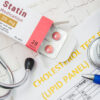Some really useful drugs have irksome side effects, but not all of those persist. Soldier through one or more unpleasant initial symptoms for a few days, weeks or months, and they may subside. What is left is an effective, tolerable treatment.
Norman Tomaka, a clinical consultant pharmacist in Melbourne, Fla., says initial side effects are to be expected when you incorporate any new drug into your body as it physically adjusts to the medication. However, in most cases, the body returns to normal functioning, and side effects subside.
“It’s just the way our bodies defend their normal patterns,” says Tomaka.
Here are common drugs that each have at least one major off-putting side effect that will likely go away:
- Metformin, a first-line drug for type 2 diabetes, causes diarrhea and other gastric distress with each change of dosage; typically goes away in a few days.
- Nexplanon, a progestin-only birth control implant, is 99% effective, but heavy or irregular bleeding can be a particularly off-putting side effect. It usually abates after 3 to 6 months.
- Zoloft (sertraline), a veteran treatment for depression, obsessive-compulsive disorder, panic attacks and social anxiety disorder, causes gastrointestinal distress that generally subsides within a few months.
- Ritalin (methylphenidate) is a common treatment for attention deficit/hyperactivity disorder. Common side effects include appetite suppression, which may go away but needs to be attended to while it persists, as it can lead to weight loss.
Browse This Article
1. Metformin
Marie Brown, MD, a suburban Chicago internist, treats many type 2 diabetics. Her drug of choice for the condition is metformin, an old, inexpensive, first-line drug. Diet and exercise work best at controlling diabetes, says Brown, but as an effective treatment, “metformin stands alone.” It costs pennies a day, and Brown says it doesn’t cause weight gain, which can make diabetes worse.
There’s just one hitch with this miracle drug: Metformin almost always causes diarrhea. It typically goes away in 2 to 6 days, but will likely return for a few days with every dosage increase.
“It almost invariably resolves,” Brown says, but physicians should always warn their patients about metformin. “They will have loose stools. They should begin the medicine when they’re going to be near a bathroom.”
To minimize diarrhea, take a low dose, as low as 250 mg, with a meal, and persevere through those few days of diarrhea, says Brown. A week after the diarrhea stops, go up to the next dose, brace for a new bout of diarrhea, and repeat the process until you’ve reached the full dose the doctor has prescribed, a process that could take weeks or even months. Even resuming the maintenance dose after a drug holiday of 2 to 3 days may bring on diarrhea, Brown says.
Maryann Collins of Oak Park, Ill., now a patient of Dr. Brown’s, has been on metformin for her type 2 diabetes for more than 20 years. She takes the maximum dose — 1,000 mg — twice a day, a total of 2,000 mg, as part of her regimen. In the beginning, she recalls, she was surprised and distressed by the bouts of diarrhea, especially since at the time she was commuting 35 miles to work.
“It was only for about a week, but I felt like, ‘Ooh, am I going to make it?’ After that week, though, it was not a significant issue,” Collins says, although she still tends “to want to be near a bathroom in the morning.”
Brown says many providers don’t walk their patients through the process of adjusting to metformin, don’t tell them what to expect and don’t tell them the diarrhea is only temporary. Many patients conclude they’ll have to stay close to a bathroom for the duration, and stop taking metformin, possibly moving on to a less effective, more expensive drug with its own side effects. Sometimes patients don’t even mention to their doctors why they’ve stopped, she notes.
The truth is, many providers don’t know that diarrhea is only temporary with metformin, Brown says. She knows this because she often speaks about drug adherence at medical conferences.
“Metformin has been around so long, it’s not taught in detail like the newer drugs that are coming out,” Brown says.
2. Nexplanon
Another effective drug with a distressing side effect is Nexplanon, a birth control implant. A rod the size of a matchstick inserted under the skin of a woman’s upper arm releases etonogestrel, a type of progestin, a hormone that helps prevent pregnancy. Placed by a trained physician or other provider, Nexplanon works for 3 years and has a 99% success rate.
That’s why Emily Gregory, an obstetrics-gynecology resident at the University of Tennessee Graduate School of Medicine in Knoxville, uses Nexplanon. “It’s more effective than a tubal ligation but completely reversible,” she says. Gregory also likes that, in her case, Nexplanon controls the pain and mood swings that can accompany menstrual periods.
If a Nexplanon user decides she wants to have children, she can have the implant removed and expect to return to her normal fertility pattern within days, says Nikki Zite, MD, a Knoxville ob-gyn and a professor at the school of medicine there. That’s a popular benefit, too.
The problem with Nexplanon is that patients typically experience, among other symptoms, irregular and often heavy bleeding. This side effect usually goes away after 3 to 6 months, but in the interim, for the patient, the bleeding can seem like a continual period, interfering with sexual relations and other aspects of daily life.
Gregory experienced spotting for a few weeks about a month after the implant was placed, “then nothing,” she says. However, 10 to 15% of women who get the Nexplanon implant have it removed because of bleeding, Zite says.
“Give it 3 to 6 months,” Zite says. If women can take daily birth control pills in addition, the estrogen in those pills can help. Ibuprofen (Advil, Motrin), an over-the-counter NSAID (nonsteroidal anti-inflammatory drug), may ease bleeding, too. Sometimes, “reassurance and time” are all a woman needs, Zite says.
3. Zoloft
Tomaka says that another effective drug with troublesome temporary side effects is the depression treatment Zoloft (sertraline). This antidepressant, also used for anxiety, can cause gastrointestinal distress. However, the common nausea, diarrhea and stomach pain ordinarily go away after a few weeks, he says.
4. Ritalin
Ritalin (methylphenidate), the popular stimulant prescribed for ADHD (attention deficit/hyperactivity disorder), may cause decreased appetite, a common symptom that may resolve with time. Meanwhile, eat plenty of healthy foods to prevent weight loss. If the patient is a child, offer fruit, whole grains and appealing proteins (don’t forget about peanut butter!), and try providing a bedtime snack. If a child’s appetite doesn’t return, re-evaluate the use of methylphenidate.







